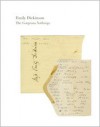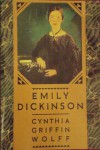Currently reading
Saints in Art
The Gorgeous Nothings: Emily Dickinson's Envelope Poems
Selected Poems
Emily Dickinson
Lies My Teacher Told Me : Everything Your American History Textbook Got Wrong
Gone with the Wind
Dead Beat
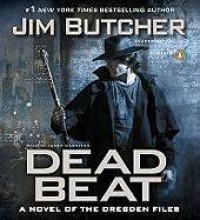 If you've seen my reviews of previous Dresden Files novels, you pretty much already know what I think of this book. I'm worried I might start boring people because my adores and complaints don't change from novel to novel, and your eyes will start glazing over as I launch yet again into the usual blah blah awesome world-building blah blah laugh-out-loud snarky humor blah but DAMN could he stop being sexist and calling it chivalrous blah blah oh and please, people are not that skeptical when it comes to the supernatural blah blah AWESOME FIGHT SCENE blah oh, Harry, you drive me crazy but you're always worth it in the end.
If you've seen my reviews of previous Dresden Files novels, you pretty much already know what I think of this book. I'm worried I might start boring people because my adores and complaints don't change from novel to novel, and your eyes will start glazing over as I launch yet again into the usual blah blah awesome world-building blah blah laugh-out-loud snarky humor blah but DAMN could he stop being sexist and calling it chivalrous blah blah oh and please, people are not that skeptical when it comes to the supernatural blah blah AWESOME FIGHT SCENE blah oh, Harry, you drive me crazy but you're always worth it in the end.So I'll just add that this is a series you really should try to read in order, because Butcher is terrific when it comes to past events coming back to haunt us in the present. This becomes clearer with every new Dresden book. Even well-intentioned actions and words are not without consequence, something I wish people in general and writers in particular would remember more often.
Also, even if you've read these books in print, do check out the audio editions, because James Marsters narrates and nobody is gay or straight enough to be able to resist his charms. (Okay, I admit I'm still waiting for confirmation from lesbians on this. I do already know straight guys who fan-girl all over his voice.)
Also also, "Butters" is apparently the surname of choice when it comes to making sure that everyone will know, before he says a word or does a thing, that a male character is not even a tiny bit "manly." First Southpark; now the Dresden Files. Which kind of makes me feel bad for all the real-world men surnamed Butters, but I also kind of think it's funny. Which I'm sure makes me bad.
Tl;dr: Read these books.
F My Life World Tour
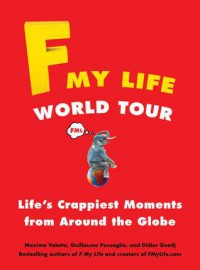 If I'm reading a book like this, you can tell I'm not feeling well and need cheering up.
If I'm reading a book like this, you can tell I'm not feeling well and need cheering up.Also, you can generally tell from my updates if you'll like a book or not. In this case, though, you're getting a rather skewed look at the material, because I didn't post any of the anecdotes that had to do with sex and/or bodily excretions and there are plenty of those here. So check out the FML website -- if you like that, you'll like this.
Also, there are several dozen anecdotes exclusive to this collection; so if you like the stuff on their site, you really should get this book.
Also, when I'm not feeling well I use the word "also" too much.
Going to bed now, and hoping I wake up well.
Little Tales of Misogyny
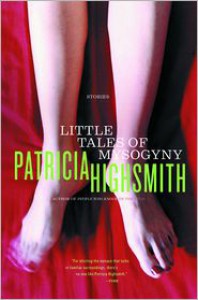 I was saving this collection for a rainy day, and yesterday – day 1 of a nasty, unexpected sinus infection – was exactly when I needed to read this weird little book. (I still have said blitzkrieg infection, so please don't expect too much from this review.)
I was saving this collection for a rainy day, and yesterday – day 1 of a nasty, unexpected sinus infection – was exactly when I needed to read this weird little book. (I still have said blitzkrieg infection, so please don't expect too much from this review.)This book is very short, as are the individual stories contained therein. As for the misogyny of the title, it puts me in mind of Virginia Woolf's ponderings in A Room Of One's Own when she was asked to speak about women and fiction. Does that mean women and the fiction that's written about them, or the fiction that women read, or the fiction they write, or a combination of all of these, or something else altogether?
Similarly, even after reading this book, I have no idea if saying that these are little tales of misogyny means that the author hates women and has written stories to reflect that hatred, or if these are simply tales about misogyny. And if it's that last one, are these stories that celebrate misogyny, or that merely reflect it? Or could they be both?
And how is all of this complicated by the fact that the author in question is not only a woman herself, but one who was at least bisexual and possibly best described as a lesbian?
I probably wouldn't be able to figure all that out even if I were well. With my head stuffed up the way it is now, there's no chance.
All I know is I burned through this book and wish I were well enough to go to the library to get more of Highsmith's stories.
This is one of those pass/fail books. There's no room for neutrality here. You'll either eat these stories up like potato chips, or you'll be left cold and possibly repulsed by them.
Or you might do all of the above. Because as I mentioned, this is a weird, weird little book.
Some reflections upon marriage
 A Translation For Ye Moderne Reader:
A Translation For Ye Moderne Reader:Dear Women:
Bad news. It's England in the seventeenth century, and men are the boss of us. And they're not being coy about it, either. There's so much to say about this I could go on all day, but let's talk about what that means when you get married. If you get married.
We're, like, centuries away from ever being able to divorce. Once you marry a guy, you're stuck with him. Plus he's pretty much allowed to treat you however he wants once he's your husband. People still use that phrase "lord and master" as a synonym for husbands, and they're saying it with a straight face.
So don't just marry a guy because he's hot and tells you he's your total love slave. They all say that. It would be pretty creepy even if it were true, and it really really isn't. Guys who act like your slave while you're courting (we don't really have dating yet) are the ones who can't wait to reverse the roles once that ring's on your finger. So watch out.
I'm working on that whole women-getting-to-go-to-college thing, but I gotta say, it's slow going so far. So if you marry the wrong guy and he treats you like crap, it's not as if you can just go back to school and get a career and a life of your own and tell him where to get off if he tries to boss you around.
So – be careful, okay? Marrying the wrong guy might be the last bad decision you're ever allowed to make.
Lots of love,
Miss Mary Astell
No One Else Can Have You
 This review will go into great detail. If you're interested in reading this book and being surprised by plot developments, you shouldn't read this.
This review will go into great detail. If you're interested in reading this book and being surprised by plot developments, you shouldn't read this.The novel starts with a killer premise – literally. Kippy Bushman, a sixteen-year-old who lives in a tiny town in Wisconsin, is in shock. Her best friend Ruth has just been murdered. And it happened when Ruth was on her way over to Kippy's house for a sleepover. Although Ruth's body was found hanging from a tree, we know this was a murder rather than suicide. Ruth's mouth was sewn shut with red thread after her mouth was stuffed full of straw.
Ruth didn't have a car, so Kippy keeps thinking about how she should have given Ruth a ride over. She obsesses over how close Ruth came to reaching Kippy's house safely – "They discovered her less than two hundred yards away from our back door. She almost made it." But Kippy also finds herself feeling annoyed at Ruth for not being with her when she's supposed to be. She feels "a sort of vague annoyance, like Ruth has gone somewhere and not invited me."
Ruth's last name is Fried, pronounced "freed." People were always calling her "Ruth Fried, like a fried egg."
"Do you think it would help if I put some of those pronunciation symbols next to my name in the yearbook?" she asked me once. "I'm yearbook vice president, so I could probably totally do that – Wait, sorry, does it sound like I'm bragging?"
"I think you're very conservative with your power," I told her honestly.
We're given a sense of Kippy's relationship with Ruth in such flashbacks. We're also told that neither of them are thrilled to live in their tiny Wisconsin town:
Ruth was the only person I ever knew who wanted to be somewhere else as much as I did. The only one who got what I meant when I said, "Friendship as in you and me is great, but Friendship, Wisconsin, sometimes feels like a bad dream that's too boring to be called a nightmare."
Kippy has been asked to deliver Ruth's eulogy by Ruth's mother, who also gives Kippy Ruth's diary. This isn't so much a gift as another writing assignment. Mrs. Fried wants Kippy to "redact the sex parts."
Kippy obediently begins to read the journal. Rather than looking for sexy-time entries, she searches for her own name. Ruth's handwriting is terrible. Fortunately, capital K's are distinctive, so she finds herself relatively easily.
Ruth here. Kippy is so pathetic it makes me nauseous. She just told me that sometimes she gets lonely before bed and talks out loud to me like I'm there, like a fucking prayer, like I'm some god or something!!! If we lived anywhere else, like any place remotely interesting, I'd have way more options, and she and I wouldn't even know each other.
Stunned, Kippy reads more about herself:
Today I told Kippy to get a hobby so it's not so obvious she's crushing on me.
Kippy also learns that Ruth has been making time with someone other than her boyfriend Colt. She's also had a sexual relationship with local lawyer Jim Steele, a.k.a. Uncle Jimmy.
I assume this is what the reviewer Blythe Harris was referring to when she mentioned this book having statutory rape. But Ruth is 18. It's still completely disgusting for a fifty-year-old man to have sex with her, but sadly it isn't illegal.
Anyway. Kippy has lost her best friend twice in the same week: first to a murderer, then to the truth.
So when Ruth's older brother Davey insists that Colt couldn't possibly be the murderer, Kippy is skeptical. Colt is a jerk – everyone knows that. He's the gorgeous football player who can do no wrong, so when he does wrong he doesn't get in trouble for it. He smashes mailboxes for fun. Which is better than putting a dead skunk in one, which he also does. He defaces the homes of girls who say no to him. He starts a town-wide botulism scare. Suffice to say, he's bad news. So, football hero or no, people are willing enough to turn on him when he's arrested for Ruth's murder.
Davey insists Colt couldn't have done it, and Kippy is swayed by his arguments. He's older and much more intelligent than Kippy, but she's the one who figures out who really committed the murder. In the process, she continues to decipher Ruth's diary. She learns a lot about herself and her best friend, who – hey! – turns out to have been pretty fond of Kippy after all.
We learn a lot about Kippy, too. How for a long time she can't stop feeling guilty about Ruth's death:
What if I'd called earlier and Ruth was still alive? And then something even more terrifying hits: What if I keep asking myself that question for the rest of my life?
We learn that her mother died years ago, and that before the brain cancer killed her, it destroyed her mind and made her see terrifying things that weren't there:
I kept trying to see her monsters out of sympathy. I imagined them living in a creepy castle surrounded by storm clouds, and visiting our house in shifts. I spun my brain creating them, squinting until bright spots formed behind my eyelids and I could carve out creatures with the stardust. I'd pretend so hard that they were real – mostly to pretend she wasn't crazy, which she was.
Pretty good stuff, that.
So why didn't this book work for me?
A lot of reasons, unfortunately.
1. The awkward structure.
The first bit of the book is a third-person omniscient prologue – a conversation between a police officer and a woman he's trying to calm down so she can tell him what the matter is. Initially, I found this short prologue a little annoying because of all the "This is Wisconsin, don'tcha know" subtlety. Later I found them baffling. Why are they here? Who wrote them?
Yes, I know Hale did. What I mean is: The rest of the book is Kippy's first-person present-tense narration of events, or else writing she could get her hands on: a newspaper article, some Facebook postings, and Ruth's diary entries. So this book exists either as a story Kippy is supposed to have written, or a peek into Kippy's head.
Where does that initial narrative fit into either of those scenarios? For that matter, how are we seeing the sheriff's logbook later on?
Also, why have this material? It's not necessary to the storytelling. And even with the bits of Ruth's diary we're allowed to see, there's not enough falling into third-person to make it feel like an integral part of the storytelling. When the narrative does suddenly swing into third-person narrative, it's jolting.
2. Ick.
There was a lot of ick in this novel. The details of Ruth's murder were the least of my problems in this respect, even after I learned she'd been cut open and disemboweled.
I've never liked disgusting details, even as a kid. But I can deal. Especially if the story is compelling.
So I gritted my teeth and hung in there with all the details of deer hunting and gutting. I was all right when Kippy described being left alone with her mother's ashes and getting caught "elbow deep in remains." I was less than thrilled by the details of Kippy's friend Ralph's parents being killed when they hit a ten-point buck on the highway and were gored by its antlers. And then, yay! Same page, here's a description of Kippy being in the car with Ralph and hitting a deer. The blood, the sound of a dear screaming, the importance of aiming for the head when you shoot a deer – what fun.
It was one too many descriptions of human excretions that did me in so far as reading this at the table was concerned. And that's where I do a lot of my reading.
So far, these are minor quibbles. Let's get to a serious problem with the story.
3. How old did you say you are, dear?
The extended quotes I offered are from early in the book. In these, Kippy sounds like what she is: a sixteen-year-old girl.
Very soon, however, this book starts to feel as if it were written by a middle-grade student. There's a difference between being a little naïve and sounding eleven years old:
I thought love meant wanting all the time for somebody to be alive – I mean it's not like if you don't love someone, you want them to be dead, or anything. But if you've chosen somebody, like really picked them out, then death is kind of where you draw the line, right?
This is supposed to have been written by a college-bound sixteen-year-old. I guess it's supposed to be cute and artless, but it's rather disconcerting to have an alleged teenager dealing with some very dark doings and sounding like an anxious and whiny pre-teen. This gets creepy when she and Davey, who's 21, start kissing.
4. Talking funny = characterization.
There's very little in the way of characterization in this book. We're told Kippy's dad is an old-fashioned Wisconsin Republican; but he never does anything conservative. On the other hand, he says things like "Is this a female body-image thing?" and "Everything you're feeling is valid," because he's a "trained psychologist."
Characters in this book have verbal tics rather than personalities. If you find the writing charming, this won't bother you. I was uncharmed.
5. You did what?
Kippy has an important "actually, come to think of it" moment after the announcement that Colt's been arrested for Ruth's murder. She's been thinking about Colt's past misbehaviors, and how he smashed her family's mailbox twice:
The more I think about it, destroying my mailbox wasn't the first time Colt targeted my house.
Kippy recalls that Colt once graffitied her home with a picture of a rattle and the words "MA-MA!" after her mother died. At the time, she told Ruth, "Only a psycho makes fun of someone for not having a mom." Later, when Ruth starts dating Colt, Kippy goes ballistic and asks what Ruth thinks she's doing, dating a guy who would do something like that to anyone, let alone Ruth's best friend.
Oh, wait. No. Kippy has no reaction at all.
Really? If your best friend starts dating a guy who did something like that to you after your mother died, it's not on like Donkey Kong?
Later, Kippy's cell phone rings. She looks down to see who it is.
Ruth cell calling...
Pretend this is you. You just looked down to see that you're getting a call from your dead friend's phone. Your recently murdered dead friend. What's your reaction?
I asked several people, and they all gave me the same answer: they'd feel freaked out because that's really creepy, and then they'd wonder who the heck had their friend's phone.
Well, that's what Kippy does, too!
Oh, wait. It isn't. Instead, Kippy gets excited because this means Ruth is alive. It's all been a big mistake! The newspaper article, the arrest of the suspected murderer, Ruth's parents sitting shiva, the funeral, the eulogy, the diary – all just some colossal mix-up!
No. Just no. I don't care how quirky you are. (More about the quirky in a minute.) That's so unrealistic, it yanked me right out of the story.
That kind of unbelievable action/reaction kept happening; and although I finished the book, it was a chore rather than a pleasure long before I finally reached the end.
6. Yep. Slut-shaming.
Lisa Staake, the daughter of the local sheriff, is described by the narrator as being "like some kind of blonde rabbit in heat." Later, she says to the sheriff, "Your daughter's a hoochie mama." Lovely.
If there can be a more generalized sense of slut-shaming, Kippy is the innocent girl in the horror movie who's completely nonsexual and survives, and Ruth is the one who enjoys sex and is killed. These do not seem unrelated. We keep getting flashbacks to conversations between Ruth and Kippy in which Ruth accuses Kippy of being jealous that Ruth has a boyfriend, or says they'll have to work on getting Kippy a boyfriend, or teasing her about being a virgin. It feels like Halloween all over again – thank goodness the innocent heroine keeps her pants on! That's how a girl stays alive in this big bad world, people!
And then there's Libby Quinn, a minor character who has "gigantic boobs." These seem to be her defining characteristic. Okay, her second defining characteristic. She has large breasts and she's a mean girl. Those two are inextricably linked in scene after scene, whether it's Libby pretending to be nice to Kippy at Ruth's funeral:
She's about a head taller than me in her heels, and when she pulls me toward her I land face-first against her gigantic boobs.
Or Libby pretending to be concerned about Kippy in front of the school's guidance counselor:
"You know exactly what I'm talking about." She shifts so that her boob is smushed against my shoulder and our thighs are touching all the way to the knee.
[Next page] "Libby, come on." I try to shrug her boob off me but it's too heavy.
[Page after that] Libby presses her boob harder into my arm.
Needless to say, Kippy is completely flat-chested and not only a virgin, but has "never experienced physical contact with a boy." Which I guess makes her as good as a girl can get.
7. The murderer
First I was annoyed because I guessed who did it early on. Then I was annoyed because the reason I guessed was that it's obvious that it couldn't have been a stranger, and it couldn't have been Kippy (though that would have been awesome). It wasn't Colt – that's why Kippy's doing all this investigating. And having it be the fifty-year-old guy Ruth was having the affair with didn't feel right, either.
So – who else hasn't the author mentioned in a really, really, really long time?
Last chance to be able to read the book yourself and be surprised by the ending.
It's Kippy's friend Ralph. And that ticks me off no end.
Because of course it's Ralph! I mean, look at him! He's weird! He's a gamer! Those people who play those online shoot-'em-up games are just bad news!
Plus he has a lazy eye! So he's creepy-looking!
Ralph gapes at me, and one of his eyes rolls slightly to the left.
And he's really intelligent:
Before Ralph got so into video games, engineering programs and tech schools all over Wisconsin and even outside the state were sending him postcards to apply. But Ralph dragged his feet, and then Mr. and Mrs. Johnston died, and Ralph inherited the house, and suddenly he wouldn't code at all anymore.
When Kippy and her dad withdraw and behave in weird, sometimes destructive, antisocial ways after Kippy's mom dies, that's just how they grieve. When Ralph pulls inward and starts playing video games nonstop after both his parents die – and it's been less than a year since that horrible car accident – it's an early sign he's a psycho killer.
Plus – and I almost can't believe the author would plant such an obvious clue so early on in the book – not only does Ralph buy lots of "collectibles and weird figurines," many of these are based on Norse mythology.
Yes. Can you believe it? The guy might as well run around wearing a shirt that says "IF I DIDN'T KILL HER, I SURE WANTED TO. (P.S. I did kill her.)"
Because, DUH. Think about it. Who's totally famous for loving Norse mythology?
Okay, aside from J.R.R. Tolkien.
I'll give you a hint. His initials are ADOLF FREAKIN' HITLER.
Yes. The author has Ralph describe Kippy in Nazi-rific terms – very late in the book, and bear in mind he's never said anything like this before:
Between her easy smile and Aryan features, she has an angelic quality.
And that's what tips Kippy off.
Ralph is racist...ish. All of his Thor dolls and Norse mythology – that's Nazi stuff, isn't it?
Um. I guess.
Other than the fact that I know plenty of gamer nerds who like Norse mythology. And non-gamers, thanks to the Thor movies.
The fact is, it's ridiculous and forced to have Ralph be the murderer. Really forced. Remember Kippy's "Oh, hey, I totally just now remembered something that would have been really important to a real person" moment about Colt? 320 pages into a 380-page book, she has another delayed memory incident:
He did kind of have a thing for Ruth. I hated her for thinking he was creepy. But now I remember how she was the only one he paused his video games for. Ruth even told me once that he was always staring at her, and that it made her uncomfortable. Only back then I figured she was just being full of herself.
Why? Why, when this is your best friend whom you love so much it's understandable she thinks you're "crushing on" her, would you brush something like that aside? Especially when your dad's a freakin' psychologist and you're supposed to be intelligent and observant?
Colt, the one who "kind of tortured everyone, come to think of it," turns out to be just fine. Not a murderer, anyway. Just a prankster! Silly Colt, who "had this weird habit of pranking all the girls he hooked up with, as a way to embarrass them for not going far enough, or just to break up with them"! What a kidder!
And last but so not least my brain's been screaming with it since I started reading this book:
8. Quirky! Quirky! Quirky!
The novel starts out with a scene from the motel Kippy and her father are staying in:
My name is Kippy Bushman, and I am bereaved. Right now I'm bereaved on the toilet. Well, not like going to the bathroom or anything, more like using it as a chair. For some reason the motel put a television in here, so I've got the seat down and my pajamas on with my knees pulled up toward my face.
My first thought on reading this was, "Really? The TV's in the bathroom? Um, okay."
That's a sign of things to come. In Friendship, Wisconsin, even the motel bathrooms are quirky.
So are the people. Every last one of them.
And not just bathroom-TV quirky. WAY quirky.
Look at Miss Rosa, the instructor at the local anger-management class! She's Polish, so she talks funny! (See point 4, above.)
"Once I raise the puppies for money," she said. "The splendor make me wild. I squeeze too hard – poof! – many dead."
I think this is supposed to be funny. As is this:
One time during a meditation session I let myself fall asleep on her shoulder and she pinched me. "Don't be closer please," she said. "I am wanting for to strangle."
Kippy returns to this class, bringing Davey with her. She's convinced this will help them learn the characteristics of a killer. She says they're there because Davey's abusive:
"I keep hitting her," he says. "But I want to stop."
"You can't see the bruises because they're under my clothes," I add.
And, oh, yeah – Davey lost part of his hand while he was in the military, so Kippy goes along with it when Miss Rosa decides Kippy must have bitten off Davey's finger and that's why they need to take this workshop.
Quirky!
Kippy and her dad used to have a pet cat named Mother Peanut Butter. After the cat died, they got her professionally stuffed and mounted:
And when she's not situated on her favorite spot on the couch, we even make her the centerpiece at our kitchen table.
QUIRKY!
She keeps Mother Peanut Butter out of the way when Davey comes over for dinner one night, though:
Dom is frying hot dogs in mayonnaise and butter, breaking up white bread into a bowl with his free hand.
QUIRKY QUIRKY QUIRKY!
Kippy is briefly committed to a mental institution. Her roommate is a twelve-year-old American girl who's convinced she's a forty-year-old male detective from Scotland Yard.
Friendship, Wisconsin: A place where even the mentally ill are adorably quirky.
There's little room for mild response to the humor in this novel. If you don't love it, you'll loathe it.
I didn't love it.
One star, and please let me forget this book quickly.
A Dance with Jane Austen: How a Novelist and Her Characters Went to the Ball
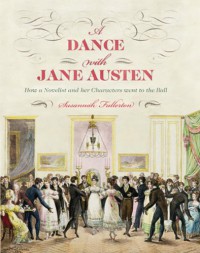 Like so many of my research books, this one's exactly what it sounds like. Unlike so many of my research books, this one's definitely intended for a popular readership. It's full of information while managing to be a fairly light and pleasant read. It's also quite pretty – there are lots of full-color illustrations, including a photo of a pair of gorgeously worn-out embroidered satin dance shoes.
Like so many of my research books, this one's exactly what it sounds like. Unlike so many of my research books, this one's definitely intended for a popular readership. It's full of information while managing to be a fairly light and pleasant read. It's also quite pretty – there are lots of full-color illustrations, including a photo of a pair of gorgeously worn-out embroidered satin dance shoes.The information is presented in an engaging fashion, which is a decent accomplishment for a book that really is everything anyone ever wanted to know about Regency balls: clothing (men's as well as women's – dress correctly, gentlemen, or you might be barred at the door); transportation (sedan chairs in Bath, walking or carriages everywhere else); the dances (everything from a reel to a quadrille described in loving detail); the food served at the all-important supper (pineapple for dessert was the height of fanciness); even the fact that the dance right before supper was served was an especially significant one, since when that dance ended, "a gentleman accompanied his partner into the supper room, sat talking with her while they ate, and plied her with the best things from the table," providing "a wonderful courtship opportunity."
If you're researching the Regency or are a full-on Austen fan, I recommend this book.
I'll Mature When I'm Dead: Dave Barry's Amazing Tales of Adulthood
 There. I added the much-needed "rereading" shelf to my options. If I were a true nerd, I'd have "re-rereading" and "re-re-rereading" shelves; but I've never been one of those people who knows exactly how many times I've read a book. When it comes to keeping track of that kind of thing, I'm like one of those cultures who only have the numerical concepts of "one," "two," and "many." I know if I've only read a book once, and I generally remember if I've read it twice. After that, it falls into the "many" memory bin.
There. I added the much-needed "rereading" shelf to my options. If I were a true nerd, I'd have "re-rereading" and "re-re-rereading" shelves; but I've never been one of those people who knows exactly how many times I've read a book. When it comes to keeping track of that kind of thing, I'm like one of those cultures who only have the numerical concepts of "one," "two," and "many." I know if I've only read a book once, and I generally remember if I've read it twice. After that, it falls into the "many" memory bin.This is a "many" book for me. I love Dave Barry, and my son's reading him a lot now. So I'm rereading this collection in a haphazard fashion -- five minutes here and there. Five minutes can get you pretty far in a Dave Barry book.
What sets this collection apart is that Barry wrote it after he retired from writing his regular newspaper column, so the essays are very long. He can relax and enjoy himself without having to worry about word-count.
I like the fact that Barry is obviously a dog person (he's been writing about his dogs for decades now), yet has no illusions about dogs:
A dog is a companion that, if you feed it and pet it and pretend that you sincerely want to take away its ball, will give you, in return, totally unqualified love. You could be Charles Manson, or Hitler, or even a lawyer who advertises on television, and your dog will still think you're the greatest thing ever. This tells you something very important about dogs: They are not very bright.
On the other hand, this collection is to blame for the fact that I've read two of the Twilight books. Barry wrote a parody so hilariously awful that I had to see just how bad they were. Bad enough that I couldn't make it through the third one, is the answer. But I'll never have that time back again.
UPDATE, 10/16/14: Just reread this via Audible recording. Dave Barry reads his own work, and he's very good at it.
Caddie Woodlawn/Newbery Summer
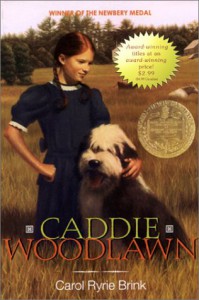 Reading this in your forties while you're also reading Lies My Teacher Told Me is very different from reading it when you're ten years old. Although even then, I remember cringing a bit.
Reading this in your forties while you're also reading Lies My Teacher Told Me is very different from reading it when you're ten years old. Although even then, I remember cringing a bit.Because on the one hand, Caddie Woodlawn is all kinds of awesome. She's a redhead roaming wild in the woods of western Wisconsin, and you won't catch her sewing a seam or polishing the furniture when she could be climbing a tree or plowing a field.
On the other hand, this is Wisconsin in 1864. "Pioneer days," as the book calls them. And that's some problematic territory.
Eleven-year-old Caddie and her brothers start off their adventures crossing a river, though they haven't a boat and can't swim. They're just that unstoppable.
But here's their idea of idle conversation:
"Do you think the Indians around here would ever get mad and massacre folks like they did up north?" wondered Warren.
Warren is quickly reassured by his brother:
"No, sir," said Tom, "not these Indians!"
"Not Indian John, anyhow," said Caddie.
Later on in the book, the white people in this little Wisconsin town freak out because they think the Indians are going to rise up and murder the whites in the night. Because that's what Indians do.
Only two years before, the Indians of Minnesota had killed a thousand white people, burning their houses and destroying their crops. The town of New Ulm had been almost entirely destroyed. Other smaller uprisings throughout the Northwest flared up from time to time, and only a breath of rumor was needed to throw the settlers of Wisconsin into a panic of apprehension.
Caddie's father says it's all nonsense and tavern rumors.
"I am willing to stake my farm, and a good deal that I hold dear besides, on the honor and friendliness of the Indians hereabouts."
So as a child, I absorbed the following lessons:
1. Indians randomly committed massacres against white "settlers."
2. There were individual exceptions, so Indians like Caddie's friend "Indian John" were okay.
3. But in general, there was no telling what kind of violence might occur and when the Indians might decide to engage in an "uprising."
Now, I was cognizant enough to cringe later in the book when Caddie kindly buys some presents for three little boys whose mother is a kindly Indian and whose father is a lazy white jerk. Some of the presents are red handkerchiefs:
The little Hankinsons were speechless with delight. The red was like music to their half-savage eyes.
That's enough to make even a dumb suburban white kid flinch.
But the rest of it? This was a novel, true, but it was based on the author's own family's experiences, just as Laura Ingalls Wilder's books are fiction based on fact.
So the conclusion I drew was that, yes, Indians had been really scary and it wasn't much of a wonder that the whites hadn't gotten along with them. Even the nice ones, like Indian John and the Hankinson kids' mother, just couldn't assimilate quickly enough to the new dominant culture, or be nice enough to convince the whites they meant no harm; so in spite of plenty of good intentions on both sides, they faded away and disappeared.
I never learned much history in school; but in general, I thought I knew what I hadn't learned. That is, I didn't know much about, say, American government, or the War of 1812; but I knew they were there.
I didn't know anything at all about the Indian wars, and I didn't know there was anything to know about them because they weren't even introduced as a concept. Wars were something white people fought against other white people – the Americans against the British, the British against the French, the Germans against pretty much everybody else.
Indians and white people clashed, sure. And the whites were pretty rude to just come on over to the Americas like there wasn't even anybody already living here. (My teachers did get that much right, though they were pretty soft on the details.)
But wars?
So when I read that bit about the massacre in Minnesota in Caddie Woodlawn, I took it at its word. And to be fair, the book is not all about those awesome whites and the bad Indians they're up against. Whites are often viciously violent themselves:
Sometimes, leaving the women and children at home, the men went out to attack the Indians, preferring to strike first rather than be scalped in their beds later. The fear spread like a disease, nourished on rumors and race hatred. For many years now the whites had lived at peace with the Indians of western Wisconsin, but so great was this disease of fear that even a tavern rumor could spread it like an epidemic throughout the country.
Okay. But the "massacre" of New Ulm wasn't a random spate of violence. It was, as I only learned when I reread Caddie and did some Googling, part of what is variously known as the Dakota War of 1862 and the Sioux Uprising. It was triggered by – what a surprise – treaty violations on the part of the U.S. government, and corruption in the Bureau of Indian affairs. I'm way oversimplifying, but after months of attempted negotiations on the part of the Dakota led to nothing better than broken promises and famine, war erupted. Not random massacres because that's just what those Indians do: war.
In the last half of 1862, the U.S. government was fighting not one war, but two.
Nobody taught me that.
Caddie Woodlawn is a beautifully written book, but like Gone With The Wind, it perpetuates some deeply harmful myths.
By all means, read this book. It's important and, when it's not talking about Indians, often hilariously funny and deeply touching.
But please also read the chapter "Red Eyes" in James Loewen's Lies My Teacher Told Me, so you can get the whole story. Read about what's wrong with the author of Caddie Woodlawn describing Wisconsin as a "wilderness" and the white settlers as "pioneers," and why it didn't matter how good "good Indians" like Indian John were.
I'll end with this paragraph from that book:
The overall story line most American history textbooks tell about American Indians is this: We tried to Europeanize them; they wouldn't or couldn't do it; so we dispossessed them. While more sympathetic than the account in earlier textbooks, this account falls into the trap of repeating as history the propaganda used by policy makers in the nineteenth century as a rationale for removal – that Native Americans stood in the way of progress. The only real difference is the tone. Back when white Americans were doing the dispossessing, justifications were shrill. They denounced Native cultures as primitive, savage, and nomadic. Often writers invoked the hand or blessings of God, said to favor those who "did more" with the land. Now that the dispossessing is done, our histories since 1980 can see more virtue in the conquered cultures. But they still pictured American Indians as tragically different, unable or unwilling to acculturate. The trouble is, it wasn't like that.
Guards! Guards!
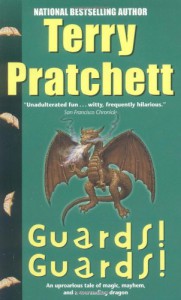 How To Read Terry Pratchett's Discworld Novels
How To Read Terry Pratchett's Discworld Novels1. Skip the first two books in the series. This is crucial. If you read these first, you will be rightly annoyed by their just-barely-okayness, and spend the rest of your life muttering about how overrated he is.
Terry Pratchett wrote these two books. Then all of a sudden he started writing really, really well. I don't know what happened. Maybe he sold his soul. My own theory is that his long-suffering wife waited as patiently as she could for him to pull himself together as a writer; and then, after she proofread his second novel, something in her snapped and she thwapped him in the head with the book in question. "You're better than this, damn it!" she shouted. "Now get in there and write something good!" And he did.
2. Start with the first book in one of the subseries'. The Discworld books all take place on the same planet, but they involve different groups of people:
The witches (my favorites)
The Night Watch (my also-favorites)
Death (granted, he's not a group, but he does have a family)
The wizards
Okay, there are standalones, like Small Gods. And in a way, all the Discworld books are standalones. (Except for the first two, because the first one ends on a cliffhanger. Like I said, skip them until you've read some of the really good ones, and then brace yourself and read them purely for continuity purposes.) I started with the 23rd book in the series, Carpe Jugulum, and was perfectly fine, other than a tendency to preach the gospel of Discworld Is Flippin' Amazing And You Have To Read These Books, which I'm trying to get under control.
But it's a lot of fun to follow the threads. To start, for instance, with Equal Rites, which introduces you to both the witches and the wizards. (This isn't Hogwarts, and those most definitely are not the same thing in Discworld.) Then you can go on to Wyrd Sisters and Witches Abroad, and fall absolutely in love with Granny Weatherwax and Nanny Ogg. (I fully intend to be Granny Weatherwax when I grow up, right down to the goat farm and the ability to terrify people just by saying "Good morning." Watch this space.)
Or you can start with Guards! Guards!, and be introduced to the men of the Night Watch. Just bear in mind that I'm first in line if Captain Vimes becomes available, so keep your inevitable crush on him to yourself.
I posted approximately 17,000 updates while I reread this book, all quotable quotes. That's not even all the bits I wanted to post, but Goodreads has a strict word-count limit on updates because Goodreads h̶a̶t̶e̶s̶ ̶m̶e̶ knows how I get.
You can get a perfectly good sense of whether or not you'll enjoy Guards! Guards! by perusing said updates. You will enjoy it if you already enjoy fantasy; you will very likely enjoy it even if you don't generally enjoy fantasy, because the humor, characterization, and dialogue are ridiculously good.
Have a good time. And remember – hands off Vimes. He's mine.
An Unfortunate Mother's Advice to her Absent Daughters, in a Letter to Miss Pennington
 Heavy nerd territory, so I'll sum it up for you. The Unfortunate Mother in question, an eighteenth-century woman named Lady Sarah, married a second son named Joseph Pennington who seems only to have wanted her for her money – second sons are the ones who don't inherit, remember. Ironically, this man's older brother died childless, leaving him the family baronetcy after all. You just never know, even if you are a second son. (If you're a fifth son – seriously, dude. Give it up and get a job, already.)
Heavy nerd territory, so I'll sum it up for you. The Unfortunate Mother in question, an eighteenth-century woman named Lady Sarah, married a second son named Joseph Pennington who seems only to have wanted her for her money – second sons are the ones who don't inherit, remember. Ironically, this man's older brother died childless, leaving him the family baronetcy after all. You just never know, even if you are a second son. (If you're a fifth son – seriously, dude. Give it up and get a job, already.) Also ironically, Sarah's father wrote his will in such a fashion that his fortune was left specifically to her, and could not be touched or inherited by her husband. (Apparently, Sarah's dad had met Sarah's husband when he made this provision in his will. Clearly Sarah's dad was not impressed.)
The marriage ended badly. The couple did not divorce, but they did legally separate after Joseph publicly accused Sarah of adultery. Thanks to the "independent fortune" left her by her father, she could survive on her own; but the children stayed with their father when Sarah left, as the law required at the time.
So Sarah, now Lady Sarah Pennington, wrote a letter to her daughters. Rather than just sending it to their house, however, she published it. Because this wasn't just any letter; it was one in which Lady Sarah proclaimed her innocence, and threatened to publish another such letter, this one with a lot more personal details, if certain people who shall remain nameless but whose initials were My Husband, That Rat Bastard didn't stop saying that Lady Sarah was a total ho-bag.
Fortunately for Lady Sarah, this tactic worked. Unfortunately for readers like me who would have enjoyed getting some dirty details about her marriage, this tactic worked.
This letter/book is a Georgian conduct guide. So far as I can see, etiquette books such as the sort we have now – the kind that explain which fork to use and how to properly address a baronet – didn't come into existence until the Victorian period. Before that, guides for young people were moral and philosophical works, explaining that you really should try to be a good person.
"Good" sometimes meant the same thing whether you were male or female. Lady Sarah's advice on how to interact with servants, for instance, probably applied to everyone. Okay, "getting too familiar" with the servants probably meant something a lot different if you were a guy (cough). But the gist of the advice Lady Sarah offers here – keep your distance, pal – was still a good idea.
Some of the advice in this book holds up fine even to modern-day readers. Paying your bills promptly rather than being "upon the Books of every Tradesman" is still a good idea, even if we call our various methods of acquiring credit something different now (Mastercard, Visa, and How Did My Student Loan Actually Get Bigger After I Spent The Last Five Years Trying To Pay It Off).
However, some of the advice is stuff you'd never hear now, such as warnings against reading too much fiction. Yeah. That's a big issue these days – our kids are reading too many of them new-fangled novels. This is very bad, because it robs them of time they might spend, say, perfecting their rocket-jumping skills in Team Fortress.
And of course some of the advice doesn't apply now and didn't apply then for the simple reason that teenagers have never, ever listened to idiot grownups when it comes to how many hundreds of hours a day those teenagers spend lovingly perfecting their wardrobes.
Sadly, one such piece of Just Won't Be Listened To advice has to do with the tendency of a certain kind of woman to see a Bad Boy and think, "That's the guy for me! I'll be the one to make him mend his ways – though of course he'll hang on to a certain edgy charm, because otherwise he'd be just another boring nice guy. Okay, by 'mend his ways' I mean 'be willing to be monogamous once he's with me, even though he's never been faithful to anyone for longer than twenty minutes at a stretch.' Oh, and of course he'll be sweet to me even though he can still be a dick to everyone else. Because that's sexy!"
(sigh)
How sad is it that we sensible types have been trying to explain how big a load of loadness this is for hundreds of years now, and still there are plenty of women who think Heathcliff is tameable if you just try hard enough?
Anyway. I read this for free via Google Books. It's short – under a hundred large-print, wide-margin pages – and pretty entertaining, in spite (or maybe because) of barf-worthy passages like the one where Lady Sarah explains to her daughter how grateful she should be if her husband has the occasional affair but doesn't tell her, because that means he loves and respects her and doesn't want to hurt her feelings. I was waiting for her to add, "Plus he was probably thinking of you the whole time." She didn't, which is something to be grateful for, I suppose.
I was able to read some of the introduction to the critical edition of this book online for free. I was very impressed, and immediately wanted to buy a copy. Then I saw that it was $50 for a paperback book that runs less than 200 pages – and bear in mind, most of those pages were written by dear Lady Sarah. So screw it.
If, however, you become so fascinated by this book that you have to have the pricy annotated edition – would you mind letting me borrow it sometime? I'll make you brownies. Thank you.
Jane Austen and Food
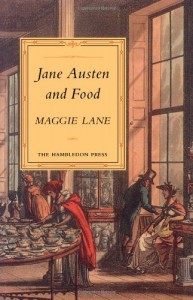 Exactly what it sounds like: a lively exploration of food in Jane Austen's life and fiction.
Exactly what it sounds like: a lively exploration of food in Jane Austen's life and fiction. Except there really is a lot more to it than that. It's true Maggie Lane explains things I always wondered about, like why General Tilney was upset about "the butter being oiled" (whatever that meant) or how Miss Bates baked her apples twice (wouldn't you just bake them until they were done?).
Lane also gives detailed information about things I didn't know enough to wonder about. The meaning of the word "morning" in Austen's time, for instance. Silly flippin' me, I figured it meant then what it means now: the span of time from waking until noon. Nope. "Morning" didn't begin until after breakfast was eaten, and it extended until dinner. It was basically another word for "day," as Austen makes clear in a letter to her sister: "We breakfasted before 9 & do not dine till ½ past 6 on the occasion, so I hope we three shall have a long Morning enough."
So women didn't pay their "morning" visits until what we would call early afternoon, because ladies often wouldn't breakfast until nine or ten o'clock, and would spend the next hour or two sewing, reading "horrid" novels, or engaging in light household chores such as consulting with the housekeeper.
And if morning extended until dinner, "afternoon" was the few hours between dinner and tea. An "afternoon" walk, such as the significant one in Emma, actually took place in the early evening; and tea was not an afternoon snack but an evening ritual.
Lane explains all of this deftly and engagingly. She also gives ample details as to what sort of food one might be offered at any given time of the day in a genteel household, and what those offerings symbolize. Mrs. Bennet's invitations to supper speak of her lower-class origins; the French bread and morning chocolate at Northanger Abbey's breakfast table scream of General Tilney's selfish snobbery.
Just don't expect recipes. Lane writes about Regency food; if you want to learn how to actually prepare such food, you'll need a copy of Hannah Glasse's 1747 The Art of Cookery Made Plain and Easy, or Mrs. Rundell's A New System of Domestic Cookery. (I got a copy of Persephone Book's 1816 edition of this latter book. It's gorgeous, but I did have to order it from England. Glasse's book is available from Amazon, and will tell you everything you need to know about how to make a vegetarian Hedgehog for dessert. But I digress.)
Jane Austen and Food is essential reading for anyone researching the Regency. It's also a lot of fun.
Gift of Gold
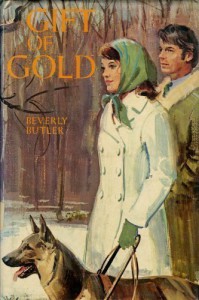 Another childhood favorite I reread recently as a brain-break – a sequel to Butler's Light a Single Candle, which I'd suggest you read first if you want to pick this one up. Gold could stand alone, but it has much more impact if you know the main character's background.
Another childhood favorite I reread recently as a brain-break – a sequel to Butler's Light a Single Candle, which I'd suggest you read first if you want to pick this one up. Gold could stand alone, but it has much more impact if you know the main character's background.After losing her sight at the age of 14, Cathy Wheeler had to give up her dreams of becoming an artist. Light ends with a suggestion that she'll go on to become a writer instead. But Gold begins with Cathy in college studying to become a speech therapist.
I remember as a kid feeling disappointed by this turn of events, especially when it becomes clear immediately that Cathy is not in love with her studies. She's hardworking and conscientious, but she fell into her major pretty much by accident, and is now sticking with it more from stubbornness than anything else.
She tells herself she's just being practical. Plenty of people have jobs they don't adore, after all. But as her friends and family pursue work they're passionate about, her stolid pragmatism begins to crack.
The main plot line is ostensibly about the hope an eye doctor offers her for regaining some vision, but really this is a story of a young woman learning not to settle for less than true love – not just romantically, though that's important too, but in every aspect of life. Yes, Cathy is completely blind. She's also solidly middle class, and has all the options that come along with a supportive family and the chance to obtain a university education. Under those circumstances, why on earth would anyone slog through life doing a job that makes them feel just "meh"?
Recommended for all ages.
The Giver
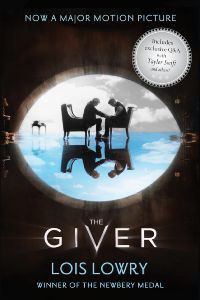 If Brave New World and Ayn Rand's Anthem had too much to drink one night and started flirting and then started more than just flirting, and 1984 was invited to the party but mostly just watched, and How The Grinch Stole Christmas wandered over now and then to pound on the door and ask if they could please keep the noise down a little – this book would have been the result.
If Brave New World and Ayn Rand's Anthem had too much to drink one night and started flirting and then started more than just flirting, and 1984 was invited to the party but mostly just watched, and How The Grinch Stole Christmas wandered over now and then to pound on the door and ask if they could please keep the noise down a little – this book would have been the result.I'm not sure that tells you what you need to know in terms of whether or not you'd like to read this book, so I'll try to elaborate a bit.
I liked it. Then I got annoyed by it. Then I hit the "OH DEAR GOD THAT DID NOT JUST HAPPEN" incident, which is not something you can simply walk away from, literally or metaphorically. Then I reached the end, which I thought was fine though I know some people found it abrupt.
Lowry's writing is smooth and persuasive throughout. What I had trouble with was her world-building.
There are so many surprises in this story that I don't want to get too specific. But I'll point out a few things in a reasonably spoiler-free fashion.
1. We learn that this dystopian future is utterly regulated, right down to complete climate control. No more snow. No more hills. No weather or landscape that's anything but smooth and predictable. Okay. But there's a river that's significant to the plot. A river. You know what a river is, right? – a bunch of water that flows downhill, generally as a result of melting snow atop a mountain?
2. I have to be really vague here: Given everything we know about this society – what are those geraniums doing there?
3. Who's the vaguest one of all? Right here. Re the "OH NO THAT DID NOT JUST HAPPEN OH YES IT DID" incident: Given the near-magical levels of technology we've had described for us, and the completely non-sexual methods of reproduction implied, is it possible for any twins who are conceived to be anything but identical?
4. Don't get me started on how the heck memory is supposed to work in this world. Just – don't.
This book is beautifully written, and the characters are convincing. If you're a nice person who gets caught up in the story, you'll find The Giver a compelling read. If you're a cranky old redhead with a habit of saying, "BUT THAT WOULDN'T HAVE HAPPENED IN THE FIRST PLACE," you'll have a harder time of it.
That said, I plan to look for the next book in the series on my next library visit. If I find it and finish it, you'll hear from me.
And Both Were Young
 Just a wonderful story, set shortly after World War II.
Just a wonderful story, set shortly after World War II. Philippa Hunter, a timid, artistic teenager, must attend a Swiss boarding school while her father, a professional painter, travels Europe. Philippa ("Flip" to her family) knows this year is going to be horrible. She's never been able to make friends – she's awkward both socially and physically, more so than ever thanks to a kneecap shattered in the car accident that killed her mother the year before. She's always clung to her family, and now she's going to be on her own for the first time in her life.
Spoiler alert: The girl who's convinced she has no courage at all finds enough to perform a truly heroic act for the sake of someone she cares about. The unpopular girl becomes one of the best-liked kids in her class, not by getting a spiffy new haircut and attitude but by sharing her artistic gifts. The klutz finds a sport she can enjoy and excel in. The motherless girl who's never talked to a boy in her life finds friendship and more in a young man who teaches her that being able to remember a lost loved one is a precious gift.
The prose here isn't as luminous as that in L'Engle's Camilla, but there's also no horrifying sexism. The love story makes you want to cheer. And the dialogue is terrifically funny. Also, Flip's relationship with a particular teacher reminds me a great deal of some scenes in Jane Eyre.
If you like the sound of a good old-fashioned young adult novel that stands up perfectly to the test of time, read this book.
Blood Rites
 Dear Jim Butcher and Everyone Who Looks Like Jim Butcher:
Dear Jim Butcher and Everyone Who Looks Like Jim Butcher:So apparently if men like motorcycles (and a great many do), it's because motorcycles are awesome. If women like them, it's because women have a space between their legs that needs filling. Got it. Thanks.
Sincerely,
The Bitter Redhead
As you can see, this book got four stars from me. That's how you know how good the dialogue, pacing, plotting, characterization, and world-building are. If Jim Butcher would stop doing stupid things with women, he'd be getting five stars from me consistently.
Instead, he does – well, the abovementioned motorcycle incident. ("You're right, Harry – it is like a vibrator!" a female cop cries after apparently climaxing on the vehicle in question.) And he has a female cop really enjoying it when, in the middle of an extremely tense rescue operation, a man she barely knows, and who pretended to be a big fat sexist pig when they first met, has to remove her blue jeans so she doesn't set off any alarms. ("It just felt so good to have a strong man touching me." Oh, PLEASE.)
But. Think about how righteously hacked off I sound, and then think about those four stars this book got anyway. And look at all the quotes I posted in my updates, especially the ones about the guy trying to pick out his porn-star name. And then go ahead and read this book.
Just don't read it first if you haven't started the Harry Dresden books yet. They are so much better if you read them in order.
In The Crosshairs II
 Preview Review!
Preview Review!A friend of mine told me about Jefferson Smith's "Immerse Or Die" site. If you haven't heard of it: Mr. Smith accepts submissions of indie novels. He reads them during his 40-minute treadmill workout. If he hits 3 "WTF moments" in 40 minutes or less, the book fails the test (dies). If he makes it all the way through his workout without switching to another title, the book has successfully engaged him. Either way, he posts a report that includes how long the book survived and what was wrong (or right) with it.
Along with these reports, Smith's site includes an article called "The 5 Most Common Writing Mistakes That Break Reader Immersion." I highly recommend it. It's a terrific read, factual and non-malicious. And it's where I heard about this novel, because Edith J. Pace posted a comment there.
Now, I have a soft spot for the name Edith, possibly because I'm a huge Edith Wharton fan. And I have a lot of sympathy for someone who admits without sounding whiny that she's baffled as to why her books aren't selling.
So I decided to give one of her novels a Preview Review.
Ms. Pace is not a Goodreads member, so far as I can tell. She doesn't have an author page, anyway. My first recommendation to her, even before I read her work, would be to change that. Establish a presence on GR. Set up an author page. Do some giveaways. Write some reviews.
Also, only two of the books she has available on Amazon are listed on GR. She should definitely update her info here.
And the title of the book I'm reviewing seems to have a major typo on both the Amazon and the Goodreads listing. It's really just called In The Crosshairs, but it shows up as In The Crosshairs II. That makes it sound like a sequel, and people aren't as likely to pick those up. I could tell from the description that it was a standalone work, but not everyone is going to look that far.
Speaking of the description, let's take a look at that:
A what-if tale provoking thoughts about resources available if all amenities were lost due to invasion, hurricane, flood, fire, rebellion and in this case, an invasive takeover by rebellious madmen determined to challenge all we hold dear and sacred.
Ouch. That first sentence is much too long. It's also impersonal and preachy. Readers are looking for something inviting. We want a story. And we don't like being told what to do. I felt a little huffy when I was told what kind of thoughts this novel would provoke. I couldn't help thinking, I'll be the judge of that, thank you.
I'm no judge of cover art – I have no visual skills. This cover seems fine to me. But that title-typo and summary are off-putting, which means there are two barriers standing between this novel and a reader who has a lot of books to choose from.
But I'm made of stern stuff, at least if I've only committed to trying to read the preview pages available. So I shall persevere. Let's open this book...
Cathy Farrington smiled inside the scratchy wool scarf tied across the bottom half of her face.
Hey. That's pretty good. Short and to the point. Makes me want to keep going. Okay.
Her own breath flowed in a pulsating warmth against her cheeks.
Could have done without the "own," but it's not fatal. Let's keep going. Where is she? Why is she smiling?
Never, in all her girlhood imaginings, would she have dreamed she could sit like this, freezing, in a deer blind.
In one paragraph we've learned that Cathy is a grownup, probably at least middle-aged – we don't tend to think about our childhood imaginings until we're safely past them. We know where she is, and that she's surprised to be there. Pleasantly surprised. Why is that?
A perfectly good start. I want to keep going. I can't copy and paste, so from here I'll just share significant stuff.
The Texas sky was a pre-dawn ebony dome.
I like it.
She felt as if she could see half of the world from the height of the wooden tower.
That's a decent sentence. It also introduces civilians like me to the fact that a deer blind is a tower.
Cathy didn't like the dark. She never had. It made her feel claustrophobic. She could remember sleeping with a nightlight long into her teen years, until her parents insisted she was "too old for that nonsense." She had been obediently ashamed of her childish fear but had never gotten rid of it.
"Obediently ashamed" is very well done. And this is sympathetic without being mawkish. Still liking what I've seen so far.
Oh, this is sad. Her husband has "teased" her in the past by turning off all the lights and
grabbing at her from a shadowy corner, laughing at her screams. He thought she was exaggerating and she never told him otherwise. She never told him how her heart pounded, how her throat constricted, how her eyes stretched, sightless in the void.
Eyes stretching is a little iffy, but I'm not feeling persnickety, the way I am when a writer pushes my patience right from the start with spelling errors and clumsy phrasing.
It was then, with a sense of accomplishment that she found herself sitting alone in the black of a winter's night, 25 feet above the ground.
That comma after "then" shouldn't be there. This should be something like, "So it was with a sense of accomplishment..."
Earlier the day before, they had driven the two hours to the lease and had cleaned the wasps' nests out of the blinds. Today was the opening day of the season and the early norther had attracted more hunters than usual.
I like the bit about the wasps' nest, but what the heck's a norther? Is that a typo, or something I haven't heard of?
(Remembers her handy-dandy laptop dictionary.)
norther: noun. A strong cold north wind blowing in autumn and winter over Texas, Florida, and the Gulf of Mexico.
That's on me, then. Fair enough. Go on.
when she had pressed him about the cost, he had become very irritated, telling her "hunting was a man's business."
He's such a charmer!
The author is using quotation marks a little too liberally. They don't belong here. It should either be:
He became very irritated. "Hunting is a man's business," he'd huffed.
or just leave out the quote marks and keep the text the same.
Yeah, see – she's doing it again in the next paragraph:
The fact that James insisted she come because the "important people were all taking their wives this time" did not influence her in the least.
Same thing. Either leave out the quote marks or rephrase it slightly so it's a direct quote. I'm still interested in the story, and the character is sympathetic to me, but this is weakening the writing.
Okay, now she's thinking about holiday preparations, and visits from their two older sons. Some nice characterization...
...oh, ouch. Big fact typos partnered with some clunky phrasing and I feel like I ran headfirst into a rail:
James wouldn't discuss Paul, except to snort derisively, "the squalor of Africa's slums will cure him from sucking eggs!."
It's a good thing that wasn't in the first paragraph, or even the third, or I'd be outta here.
Okay, I like the stuff about her third son, Taylor – but this sentence is a little awkward:
At sixteen, Taylor's uncompromising independence was James' most frustrating enigma.
I know what you mean, but I just don't think you're supposed to say it like that. The rest of the paragraph is great, but I'd tighten that up. Maybe his independence "never failed to baffle James" or something.
...okay, the rest of this chapter is good! Except I guess it's the prologue, because the next part is "Chapter One," and it starts with someone receiving a phone call from the president. Let's see if the author can handle this complete change in tone and material...
"How did he take it?"
"Like the rest of us have taken this death sentence, Malcolm. With a resigned horror."
Hmm. Maybe lose that "a."
Uh-oh. She underlined a word instead of italicizing. Please don't do that.
And his eyes shouldn't glint "wetly." That's gross. Also redundant.
Worldwide killer disease...decent premise...maybe say "lethality" rather than "lethalness"...oh, and projectile vomiting is sudden by definition, no need to specify that...
I have no idea if this medical stuff would set off any alarms in a better-informed reader, but it seems fine to me...
Ken became conscious of his heartbeat pounding against his eardrums. He wondered without any concern whatsoever, what his blood pressure was. With people dying right and left, spiking blood pressure levels didn't seem very important anymore.
I like this sentiment, but take that comma out after "whatsoever," or put one in after "wondered."
...hmm. I like the information in this paragraph where the captain is briefing everyone, but it's way too long. Put in some paragraph breaks.
...and I think the bit about the extremes to which the marauding hordes are resorting should be delivered crisply, rather than in a whisper. I honestly don't see how any of this could be a shock, especially to a military man. Good stuff, though.
Speaking of men – I think considering how few people are left at all, some of the top muckety-mucks at this important meeting would be women. Not a ton, but some.
...ooh, nice chapter ending! Didn't see that coming! (And neither did Ken!)
Chapter two – looks like we're back to Cathy...
...and wow, is life way more of a bummer than it was when last we saw her in the deer blind.
This is good stuff – a complete social breakdown, after an initial trauma-bonding among survivors. But when you're talking about the gangs that now dominate the streets, try to steer clear of phrases like "the sound of their rumbling, roaring approach evoked sheer terror in the hearts of those hiding in their own homes." Rumbling, roaring = nice. Sheer terror evoked = overdone.
...
Did you hear that? That was the sound of me engrossed enough in reading the rest of the chapter that I didn't feel like typing anything. The prose isn't luminous; it's a workhorse. It does its job of carrying the story. I'm interested in what happens to Cathy, so I kept reading.
Next chapter (this is a long preview!): back to Ken, guy who was in a meeting with the President when last we saw him.
Oof:
"Don't underestimate American ingenuity, Hal."
If the guy were supposed to sound like a stuffed shirt, that would be okay to have him say. I'm not sure he is.
Oh. Oh, dear. She just had one character deliver a message from a ham radio operator about what's going on with this plague. And now the guy she reported this information to just picked up the sheet of paper she'd jotted everything down on and is repeating it. And it's information we got in the previous chapter, from a different point of view.
Okay. We did just get a little new info. But the author should have divvied it up so it didn't feel like an info-dump. That was a fumble, and it came at the very end of the preview.
As did the line, "There's got to be a way to stop this madness, Hal!" This is supposed to be taking place now, and people haven't talked like that since creepy Cold War science fiction movies.
Any musician will tell you to start and end strong – and if you have to pick one, pick a strong ending. That's all plenty of people will remember of your performance.
Still – I was interested enough to get to the end of these preview pages. That isn't always the case by a long shot.
I'd like to see what happens to Cathy, and if she ever finds her family. I will put this book on my shopping list. If I finish reading the whole thing, I'll give you a full report.
Between two and three stars, so I'll round up to three.

